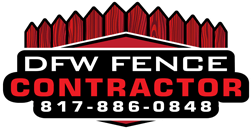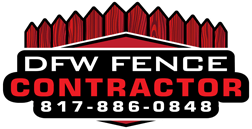Texas Fence Laws
Fence Laws in Texas: A Guide To Everything You Need to Know
Fences play an essential role in maintaining privacy, security, and the distinction of property lines. However, property owners must comply with specific laws and regulations governing fence construction and maintenance in Texas. As a , we have in-depth knowledge of fence laws in Texas. In this article, we will provide a comprehensive guide to help you understand the fence laws in Texas.

Overview of New Fence Laws in Texas
Texas has specific fence laws and regulations governing fences’ construction, maintenance, and liability. The Texas Property Code provides guidelines for fence construction, including height, materials, and location. The law also outlines the responsibilities of property owners concerning fence maintenance and repair and liability for damages caused by a fence.
Need a Dallas Fort Worth Fence Installation Company?
Dallas Fence Regulations
The home or pool fence is a type of fence that is usually built around the backyard pool to improve the safety of the pool and to prevent young children from falling and accidentally sinking. There are several varieties made of different materials, and each may come with different Dallas fence regulations. Some of the pool fences are made of aluminium tube, glass, wood, cradle and removable mesh. When choosing a home or a pool fence, you should consider your needs and budget as well as the local Dallas fence regulations to make sure you are compliant. Each variety has its own advantages and disadvantages. Majorities are also used for other purposes, besides swimming pools, and were originally designed for them, with the exception of security fences with removable mesh pool.
The removable network is often treated with many different names. Some of the names are near the swimming pool, pool barrier, fence mesh, and security fence. It is the only specialty pool fence for use around swimming pools to prevent access for children and pets. The removable fence types consist of a series of segments ranging from 6 ‘to 15’ and are connected at the top by a child-proof barrier. Each segment consists of equidistant rods mounted on perforated aluminium/plastic inserts in the pool deck or other extended surface and a grid material extending over the rods. This is made strong by the strong pressure under which it is produced and installed. You can choose between mesh fences in different colours, including white, black, light brown, green and brown. The network is almost transparent. The support rods are usually made of aluminium or fibreglass. Pool owners with artistic inclinations can choose between aluminium bars coated with powder in different colours.
All states and territories have fencing rules. Only pools excluded from the local council do not require fences. There are several needs for pool fences. As an example, pool owners should have a fence with a height of at least 1.2 meters.
But safety in the pool is only a defence. Property owners should also have many other precautions and protections, such as door and gate alarms, as well as shrink wrappers in the pool. When pool doors are made, materials similar to fencing materials should be considered. There must be a minimum gap between the goalpost and the goal to make it impossible for the minute hands to unlock the goal. Pool doors should be opened away from the pool area and, if possible, activate an alarm. The latches should be placed as high as possible on the goal and at least 3 inches from the top. The door release system should be in the pool area.
Take your time and observe the different styles. Also, consider what your goal is. If you want privacy, you may not want a fence at intervals. If you want some privacy, but you also want to see your neighbours in your garden for security reasons, you should have a shaded box. If you want to keep your dog in the yard, but you also want to see that you have a dog, then an authorization post could work well. Take the time to make sure that the Dallas fence regulations you want fit your needs, and that the fence that meets your needs is the one you like the most.
Once you know what you want, it’s time to get estimates and select a contractor. Contractors can also help you choose a fence and answer your questions.
Forth Worth Fence Regulations
ou need to understand the laws of Fort Worth fence regulations before erecting a fence. Break any rule and your fence will be demolished and you will be fined. The laws set a standard for height, materials and location. The regulations cover five areas namely fence height, materials, backyard fencing, places of specific importance and access to emergency services.
Fence Height
You will be required to apply for a permit if you want to build a front yard fence that is over feet tall. This law applies regardless of the materials used. This is because a fence that is four feet high will block your neighbor’s airflow or light.
Corner fences should not be more than 2.5 feet tall since it can block vehicle visibility. This rule is very strict, especially where children play. A fence that is more than nine feet tall is considered to be a structure. Structures have different regulations and it ’s therefore advisable not to exceed the upper limit.
Materials
Strict rules and regulations have been established on the usage of materials. It is prohibited to block free air circulation and light of your neighbor. You have to ensure that barbed wire used for fencing does not exceed six foot vertically for security reasons. It should not cross or project above the property lines of your neighbor. Therefore material used for fencing should meet the standards made so that you can live peacefully with others. For instance, the one used in private fencing should not affect light and the way people view places. The authority might come after you if you do not follow the rules set.
Need for accessibility to emergency services
Fort Worth fence regulations allows you to build a backyard fence that offers security and extra privacy. In addition, this law requires one to ensure that there is accessibility to emergency services onto your residential area(property) from the rear. It is advisable for one to consult a fire officer from an institutionalized local station at the time of making permit application. This will make you understand where to put the fence for easy access to emergency services.
Regulation on backyard fencing
Fort Worth fence regulations do not allow one to fence their property above nine foot. There is a need not to interfere with neighbors’ airflow and light. When you intend to build or construct a fence beyond six foot then you will have to seek a mandate from the authorities. You will be required to make to formal application of permit. In instances where you intend to construct a pool fence, it is advisable to consult the authorities.
Rules and regulations on important sites
Cultural or historical sites are considered to be vital venues by the government. Therefore you will be required to make a formal permit application to put a fence of any kind when it is near your property.
It is also not advisable to construct a fence on someone’s legally owned property. You will also be required to consult authorities when you want to build a fence in areas that are prone to floods. This is to enable them to do an inspection so that the fence does not lead to erosion when water overflows.
Grand Prairie Fence Regulations
Just like every other city, Grand Prairie has it’s own unique laws and regulations when it comes to fence building and maintenance. Here’s what you need to know:
Permits
In Grand Prairie, you are required to obtain a permit for all fence replacements and new fences.
Approved Materials
Approved residential fencing materials include: wood, masonry, chain link, wood slats, and wrought iron.
Prohibited Materials
Prohibited materials for Grande Prairie fence include: R-panel, metal, and plywood. All Fencing materials must be weather-tight and free from deterioration.
Fence Height
In Grand Prairie, all residential fencing must not exceed three feet in front and 8 feet in the rear yard. For more information on Grand Prairie fencing regulations and guidelines, contact DFW Fence Contractor today
Irving Fence Regulations
Every city in DFW has similar laws and guidelines to go off of for fence construction and replacement, however, each city also has some of its own individual regulations. It is important to familiarize yourself with your city’s laws. In Irving, all fence construction must be built ONLY with the materials and construction approved by the ordinance.
Fence Height
Vertical support posts and gates must not extend more than 6″ above the top of the fence. When the fence is located in a “vision triangle of a corner lot”, the fence must have a max. height of 30″ and must be 50% transparent.
All front-yard fencing must be no taller than 48″ and allow 50% transparency. All rear and side yard fencing must be no taller than 8′ in a residential area, and no more than 10′ in a non-residential area.
Sizing & Requirements
All fences MUST have a gate or opening of at least 3′ in width, any masonry fence that exceeds 4′ in height must be installed following a design submitted by a registered architect. Any person constructing a masonry fence must make sure all exterior surfaces are free from any sharp objects.
Fences may not be thicker than 24″. Any spaces within the fence ARE NOT PERMITTED to be used for storage, shelter, or an enclosure for animals.
The supporting structures of your fence must not exceed 24″ in width.
Metal posts must be used when constructing or replacing wood fences. Wood posts may be used for replacement fences when combined with intermediate metal fence posts.
Approved Fence Materials
Materials used for metal fences must be painted or powder-coated at the factory, not on the property. Fences constructed with boards must be: cedar, redwood, or other durable decay-resistant wood.
All staining, paint, or other surface treatments used on your wood fence must be manufactured specifically to preserve wooden materials.
Prohibited Materials
Rope, string, and wire (chicken wire, hog wire, wire fabric, barbs, broken glass, chain, netting, metal panels, galvanized sheet metal, plywood, fiberglass, etc.) or other that is not manufactured as a fencing material.
Any damaged materials or materials that are considered dangerous are not permitted, nor are any materials that cause a fence to be electrically charged.
Maintenance
All Irving fences must be properly maintained without clear signs of rotting and damage, termite infestation, loose materials, or rust.




























